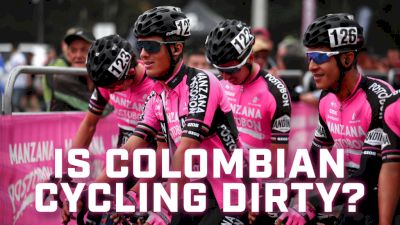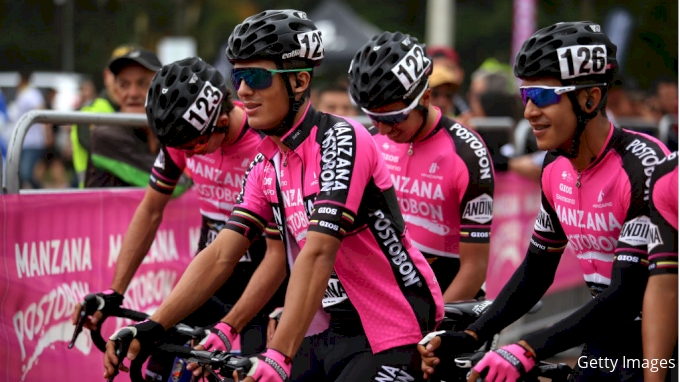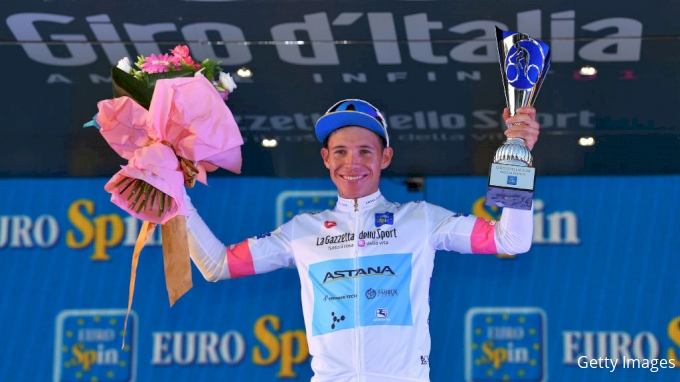Report: Doping Threatens Colombia's Cycling Talent Production Line
Report: Doping Threatens Colombia's Cycling Talent Production Line
Colombian cycling reached its zenith when Egan Bernal won the Tour de France, but there is also a dark side to Colombian cycling.

Colombian cycling reached its zenith last month when pint-sized climber Egan Bernal became his country's first winner of the sport's greatest race, the Tour de France.
Colombia is riding the crest of a wave of euphoria with the likes of former Giro d'Italia and Vuelta a Espana winner Nairo Quintana, Esteban Chaves, Miguel Angel Lopez and Rigoberto Uran all capable of challenging for victory in the sport's most prestigious Grand Tours.
Join Pro to access over 100 world class events live and on-demand
At just 22, Bernal could dominate the Tour de France for years to come.
But there is also a dark side to Colombian cycling that is little known: it has a sorry record on doping.
It's a sordid tale that AFP has uncovered by speaking to a former cycling team doctor, a retired cyclist, a physical trainer, an active coach and an investigative journalist.
All believe that cheating is a prerequisite to surviving in Colombia's highly competitive domestic cycling circuit.
According to the International Cycling Union, Colombia is second only to Costa Rica as the country with the most riders suspended for doping: it has 20.
Two of those -- Wilmar Paredes and Juan Jose Amador -- were caught earlier this year, precipitating the dissolution in May of Colombia's only professional cycling team, Manzana Postobon, which lost its sponsors over the doping cases.
Two months later, Bernal was crowned Tour de France champion.
"In the peloton, no one calls you a cheat ... everyone knows that it can happen at any time," he said.

Year of Shame
The Manazana Postobon case shows that little has changed since Colombia's 2017 year of shame.
The Colombian anti-doping agency was handed a six-month suspension in February of that year by the World Anti-Doping Agency (WADA) over quality control issues.
It meant that doping samples from the Vuelta a Colombia -- at that point the country's primary stage race -- were handled by a UCI delegation that sent them for processing in the United States.
The result was eight positive dope tests -- seven Colombians -- the most in the race's history.
That might come as a shock to those from outside cycling -- but not those in the know.
According to journalist Gustavo Duncan, talent scouts have been desperate to extract potential young stars from Colombia's domestic scene as quickly as possible to avoid "contamination."
"Foreign teams don't even look at riders over 23 because they know that outside of the youth categories, it's practically impossible to compete in Colombia without doping," added Duncan, who has long denounced the practice in the domestic peloton.
Coach Luis Fernando Saldarriaga, who discovered Quintana and Chaves, says there is a race against time to get the hottest young prospects out of the Colombian circuit.
"We never entered them into the Vuelta a Colombia because (European teams) would have doubted their capabilities," he said.
The Vuelta a Colombia was ditched from the UCI's calendar in 2018, when the Colombian federation took over anti-doping controls.
No positives were recorded in 2018 and only one from this year's gruelling 15-day race in June.

'Cover Up'
Doping has been facilitated by the Colombian federation, according to a doctor who worked with a Colombian team in the 1980-90s, who spoke to AFP on the condition of anonymity.
"Doping has existed throughout the lifetime of Colombian cycling" and the national federation has ensured to "cover it up."
Federation president Ovidio Gonzalez, who took over in 2017, denies any wrongdoing and insists the body is transparent.
"Absolutely all the positive cases we have are announced on our website and are sanctioned," he said.
But the practice continues, according to a physical trainer, who spoke on condition of anonymity as he is still working with professional cyclists.
"There are many cases of doped cyclists that weren't publicized because of the federation," he said.
Instead of publicizing the positives, the federation would instead quietly inform the riders' teams.
"It's something they did to avoid scaring off sponsors," he said.
As much as the federation may claim that times have changed, the cases of Paredes and Amador leave little hope for the future, the physical trainer said.
"If two lads that have been earning a salary since they were kids and who worked with coaches that always explained to them the importance of not doping, can become cheats, then anyone can do so," he said.
The problem is getting through to the riders themselves that there is another way.
An ex-cyclist, who raced professionally from 2008-10, says he saw packets of doping products on the floor at races.
"It was frustrating because I felt that I was already losing before the race started," he said on condition of anonymity.
He retired distraught in 2010.